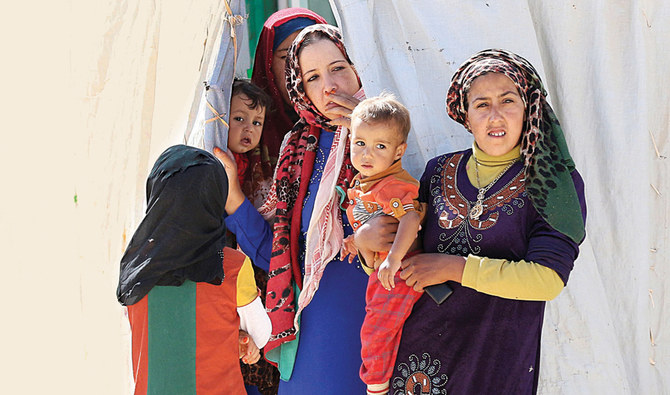AMMAN: For Um Nabil, a 46-year-old Syrian refugee living in Irbid in Jordan, preparing the iftar dinner on the first day of Ramadan was a challenge. With three children to raise alone and with little money left, she had to borrow the funds to buy half a chicken to cook for the meal.
Um Nabil’s husband left for Syria to collect his mother after his father died but has not returned for three years. Not only did her husband leave her with her three children, she also has to deal with his second wife and their child.
Despite her difficult life, Um Nabil told Arab News that her situation is much better than some. She looks out of the kitchen window and points to her three Syrian neighbors. “They live in even smaller apartments and God knows how bad their situation is.”
A few vegetables can be seen outside the kitchen window. Um Nabil has learned how to grow vegetables without soil and has been able to produce enough for her family as well as sell anything extra. She regularly plants lettuce, tomatoes and beans.
Last year Um Nabil volunteered with a local agency which gave her 13 Jordanian dinars ($18) a day in return for her help.
This year with her husband gone, she has to figure out ways to pay the steep cost of the rent at 140 Jordanian dinars per month. She depends on the monthly food stipend from the World Food Program for the amount of 60 Jordanian dinars, less than half the cost of rent alone.
As the time for breaking the fast approaches, Um Nabil’s children gather in what they call the sitting room, a room with old furniture that is in need of repair. Wafa, the oldest daughter at 17, said that Ramadan was much better in Syria: “All that is left of Ramadan is sitting together and eating rice and other things.”
Um Nabil recalls the dinners she used to prepare with many dishes and fresh juices. “We used to get what we wanted without thinking of money.”
Asked why she does not return, Um Nabil said that although her house was not badly destroyed in Dera’a, her friends advised her not to go back. “We communicate a lot and they tell me don’t come back. Life is not easy in Syria.”
The UN High Commissioner for Refugees (UNHCR) says that 137,539 registered Syrian refugees live in Irbid while Jordanian government sources say that the number is closer to 250,000.
Since the opening of the Jaber crossing point, 16,700 of the 671,000 registered Syrian refugees living in Jordan have returned. Jordan says that the actual number of refugees (both registered and unregistered) is more than 1 million.
Jordan’s promise to provide work permits for Syrians has failed to address the economic problems facing them with only 40,000 documented permits issued, according to official sources.
International agencies say that the average annual income of Syrian refugees in Amman, Irbid and Zarqa is about 3,000 Jordanian dinars while in Mafraq and some of the refugee camps the average income is 1,000 Jordanian dinars.
Nearly 98 percent of the income of Syrian families goes to pay rent, which ranges from 120 to 140 Jordanian dinars a month, according to a study prepared by the Norwegian Agency Fafo.
UN High Commissioner for Refugees Filippo Grandi has issued an international appeal for donor help to support Syrian families in countries such as Jordan during Ramadan. “Ramadan is a month of compassion, renewal and service. The resilience of refugees inspires us and reminds us that all actions that we take, big or small, can have an impact.”
The family of Um Nabil has no money and so pays little attention to the many Ramadan deserts available locally.
While some Jordanians continue to suffer economically, overall there is a wide gap between Syrian refugees and most Jordanians.
The long lines outside the Syrian ice-cream store Bakdash or Nafisa sweets in Amman, and other high-quality restaurants opened by Syrian entrepreneurs largely for Jordanian and expat clients, reflects the gap that has become more obvious during Ramadan.
















